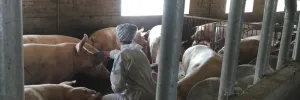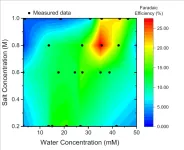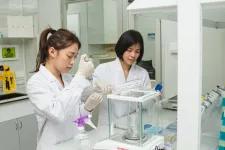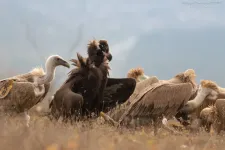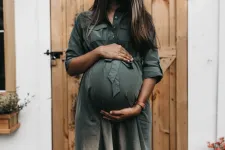(Press-News.org) Findings paint a bleak picture of little or no financial and health support from governments for their citizens stuck overseas.
At least two-thirds of those stranded aboard experienced financial distress and moderate-to-severe levels of depression—a rate that is substantially higher than the general population and health care professionals in the pandemic.
**Note: the release below is a special early release from the European Congress of Clinical Microbiology & Infectious Diseases (ECCMID 2023, Copenhagen, 15-18 April). Please credit the congress if you use this story**
**Note – the press release is available in Spanish and Portuguese, see links below**
Embargo: 2301H UK time Tuesday 21 March
New research being presented at this year’s European Congress of Clinical Microbiology & Infectious Diseases (ECCMID) in Copenhagen, Denmark (15-18 April) reveals the high human costs and negative impacts of border restrictions and travel bans during the COVID-19 pandemic on citizens stranded abroad.
The research by Associate Professor Holly Seale from UNSW, Sydney, Australia and colleagues, also highlights the poor level of financial and health support provided by national governments for their citizens stuck overseas.
These measures have affected a variety of groups including tourists, business travellers, families, international students and short-term migrant workers.
“Very little attention has been paid to the unintended consequences of these restrictions on people’s lives and wellbeing,” says Dr Seale. “Often the focus is on tourism and holidays, yet many tens of thousands of people were separated from their partners or families for 18 months or more. We hope our findings will help policymakers plan and communicate support packages for this vulnerable population in future public health crises.”
In a large programme of research, involving four separate studies, the researchers mapped the impact of border and travel restrictions on international and Australian travellers.
Limited financial and health support from national governments
First, they analysed government COVID-19-related information online and support options provided by 11 countries [1] to their citizens stranded overseas in June 2021.
The analysis found that most countries provided some level of support around repatriation options; border control and re-entry measures; medical assistance; and traveller registration. But no country provided all these types of support.
Moreover, only three countries provided information and support for emergency housing (UK, Australia and Canada) and just five offered some form of mental health support (UK, Australia, Canada, New Zealand, USA). Less than half (5/11 countries) offered some form of financial assistance (UK, Australia, Canada, France, USA).
Worse still, the quality of COVID-19-related information provided by government websites in the four countries examined (Australia, Canada, UK, and France) was poorly accessible, particularly for people with low literacy, disabilities, or limited English language proficiency.
“Our findings highlighted gaps, inconsistencies, and potential inequities in support available, and raise issues pertinent to the quality, accessibility, and usability of information,” says Dr Seale.
Alarming rates of depression and anxiety
In further research to examine the psychological and financial impact of COVID-19 travel restrictions, the team surveyed more than 2,400 individuals stranded abroad across all six regions globally between July and September 2021 and November and December 2021. Over half had been stranded for longer than five months, with the majority having more than one flight cancellation or change.
Almost two-thirds (64%) of the sample reported financial stress and moderate-to-severe depression, and over 40% experienced anxiety and nearly 60% reported being stressed. In addition, 1 in 10 experienced homelessness.
The levels of distress were found to be even higher in those separated from their partners or immediate families and temporary visa holders. Of these, over 71% reported financial stress (with an average expenditure of US$7,285); 77% experienced moderate-to-extremely severe depression; and over half reported moderate-to-severe anxiety (52%) or stress levels (63%).
“The levels of distress reported by this particularly vulnerable group are dramatically higher—over 50% more severe in some cases—than those reported by migrant workers, healthcare workers, and the general population during the pandemic,” adds Dr Seale. “Respondents also reported little to no assistance from their national governments, highlighting the importance of providing additional support to this vulnerable group in future public health crises.”
Governments need better ways to communicate
Finally, the research team asked survey respondents about how they accessed information on COVID-19 travel restrictions and its perceived usefulness. The vast majority (78%) thought social media groups were most useful, with Facebook being the most useful and most used (87%)—suggesting that this platform could be particularly influential for governments to disseminate information on future travel restrictions.
In contrast, government sources, including websites, call centres and local embassy social media posts were reported as being the least useful.
However, this obscures the role age and gender play in information-seeking behaviour. For instance, women tended to find social media more useful than men, who tended to appreciate information provided by friends and family more. For citizens and permanent residents stranded abroad aged 50 and above, the preferred method for governments to circulate information was via a designated website, whereas for those aged 50 and younger, social media, government emails and a dedicated website were recommended.
“The shift towards seeking information from social media rather than more traditional sources brings with it the challenge of curbing widespread, harmful misinformation. Over 60% of our respondents reported inaccurate or misleading information within social media groups,” says Dr Seale. What’s more, information seeking is not one-size-fits-all, underscoring the need for governments to consistently amplify clear, accurate, and timely information through multiple communication channels.”
For interviews with the report authors, please email Associate Professor Holly Seale, UNSW, Sydney, Australia at h.seale@unsw.edu.au
Alternative contact in the ECCMID Press Room: Tony Kirby T) + 44(0)7834 385827 E) tony@tonykirby.com
Notes to editors:
For press release in Spanish, click here
For press release in Portuguese, click here
[1] Australia, New Zealand, Fiji, Canada, USA, UK, France, Spain, Japan, Singapore, and Thailand.
The authors declare no conflicts of interest.
The studies did not receive any funding.
This press release is based on oral presentation 1526 at the European Congress of Clinical Microbiology & Infectious Diseases (ECCMID). All accepted abstracts have been extensively peer reviewed by the congress selection committee. Some of the research has been published in and various journals (see below), and a further study has been submitted to a medical journal for publication.
For the study McDermid, P., Craig, A., Sheel, M. et al. How have governments supported citizens stranded abroad due to COVID-19 travel restrictions? A comparative analysis of the financial and health support in eleven countries. BMC Infect Dis 22, 161 (2022), see: https://doi.org/10.1186/s12879-022-07155-2
For the study McDermid P, Craig A, Sheel M, et al Examining the psychological and financial impact of travel restrictions on citizens and permanent residents stranded abroad during the COVID-19 pandemic: international cross-sectional study BMJ Open 2022;12:e059922. doi: 10.1136/bmjopen-2021-059922 see: e059922.full.pdf (bmj.com)
McDermid P, Sooppiyaragath S, Craig A, Sheel M, Blazek K, et al. (2022) Psychological and financial impacts of COVID-19-related travel measures: An international cross-sectional study. PLOS ONE 17(8): e0271894. https://doi.org/10.1371/journal.pone.0271894
END
Research reveals substantial human cost of international COVID-19 travel and border restrictions
Findings paint a bleak picture of little or no financial and health support from governments for their citizens stuck overseas.
2023-03-22
ELSE PRESS RELEASES FROM THIS DATE:
TMAC helping businesses prevent pollution
2023-03-22
The University of Texas at Arlington-based Texas Manufacturing Assistance Center (TMAC) has received a grant worth nearly $500,000 to assist manufacturers in developing and adopting pollution prevention practices that reduce costs and environmental impacts.
The $498,836 grant from the Environmental Protection Agency’s Pollution Prevention Program allows both the TMAC Sustainability team and Process Automation Design Engineering (PADE) team to work with manufacturers to prevent pollution in areas considered environmental justice regions. An environmental ...
Early career honor for Wang
2023-03-22
A University of Texas at Arlington researcher is working to optimize supply chain management to allow for flexibility from forces outside the supply chain, such as policy changes that can cause major disruptions.
Linda Wang, assistant professor in the Mechanical and Aerospace Engineering Department at UTA, has earned a five-year, $503,000 Faculty Early Career Development Program (CAREER) grant from the National Science Foundation (NSF) for her research. CAREER awards are the NSF’s most prestigious honor for early-career ...
New animal welfare scoring system could enable better-informed food and farming choices
2023-03-22
Cambridge University scientists have come up with a system of measuring animal welfare that enables reliable comparison across different types of pig farming.
This means that animal welfare can now, for the first time, be properly considered alongside other impacts of farming to help identify which farming systems are best.
This is vital for improving animal welfare in livestock production, at a time when demand for meat is rising globally and the way animals are farmed is changing - with concerns about the welfare of intensive and indoor systems.
Animal welfare assessments could also enable consumers to be better informed when choosing what to eat.
Britain ...
Science journals update guidelines after study highlights incomplete reporting of research
2023-03-22
Several scientific journals have amended their submission guidelines after an analysis identified numerous research studies that had been published with crucial information missing.
The finding emerged from an analysis by academics at the University of Cambridge, which reviewed reports from trials evaluating new school-based programmes to increase the amount of children’s physical exercise. It found that 98% of these reports left out key details about how teachers had been trained to deliver the interventions.
The trial reports ...
Study shows ‘obesity paradox’ does not exist: waist-to-height ratio is a better indicator of outcomes in patients with heart failure than BMI
2023-03-22
New research has debunked the idea that there is an “obesity paradox”, whereby patients with heart failure who are overweight or obese are thought to be less likely to end up in hospital or die than people of normal weight.
The study, which is published in the European Heart Journal [1] today (Wednesday), shows that if doctors measure the ratio of waist to height of their patients, rather than looking at their body mass index (BMI), the supposed survival advantage for people with a BMI of 25kg/m2 or more disappears.
The “obesity paradox” relates to counter-intuitive findings suggesting that, although people are at greater risk of developing ...
The devil is in the details: Re-imagining fertilizer precursor synthesis
2023-03-22
Osaka, Japan – The Haber–Bosch reaction helps feed the world by converting nitrogen into ammonia, a fertilizer precursor. However, its carbon footprint is huge: this one reaction is the source of nearly 2% of global carbon emissions. Now, in a study recently published in ACS Energy Letters, researchers from Osaka University have helped re-imagine this reaction to improve the sustainability of the chemical industry.
Replacing the Haber–Bosch reaction with a more sustainable alternative has been an active area of research for many years. These efforts have led to a globally well-established electrochemical reaction for ammonia ...
Unmasking the secret of broadly neutralising COVID-19 therapeutic antibodies
2023-03-22
The rapid evolution and emergence of new SARS-CoV-2 variants, such as the Omicron variant, renders it highly capable of evading the host immunity.
At the same time, vaccines based on original wild-type strain of SARS CoV-2 shows reduced protection against newer variants, particularly for the Omicron variant. This results in break-through infections among those vaccinated and highly infectious among non-vaccinated individuals.
Thus, it remains uncertain whether new emerging variants of the COVID-19 disease can escape the protective immune response ...
BetaLife and A*STAR Collaborate to develop next generation cell-based therapy for diabetes treatment
2023-03-22
Up-and-coming local biotech startup BetaLife Pte Ltd (“BetaLife”) is collaborating with the Agency for Science, Technology and Research (A*STAR) to accelerate the development of next generation cell-based therapy for diabetes. BetaLife, a stem cell therapy company focused on developing regenerative medicine for diabetes, has acquired the rights to human induced Pluripotent Stem Cell (iPSC) technology from A*STAR. This technology enables the generation of iPSCs, which are cells that have similar properties to embryonic ...
Endangered vulture returns to Bulgaria after being extinct for 36 years
2023-03-22
The Cinereous Vulture (Aegypius monachus) - also known as Black Vulture, Monk Vulture or Eurasian Black Vulture - is the largest bird of prey in Europe.
Globally classified as Near Threatened, its populations in southern Europe, once abundant, have been experiencing a dramatic decline since the late 1800s. So dramatic, in fact, that by the mid-1900s, these birds had already been nowhere to be seen throughout most of their distributional range across the Old Continent. In Bulgaria, the species has been considered locally extinct since 1985.
Thanks to the re-introduction initiative that was started in 2015 by three Bulgarian non-governmental organisations: ...
Nine in 10 women enter pregnancy with at least one indicator that risks baby’s health
2023-03-22
Nine in ten women in England enter pregnancy with at least one indicator that may increase health risks to them and their baby, according to new research.
Common indicators were women not quitting smoking, failing to take folic acid before pregnancy or having a previous pregnancy loss.
Researchers from the NIHR Southampton Biomedical Research Centre, hosted by University Hospital Southampton and University of Southampton, analysed data from over 650,000 mothers.
They created a first national picture of women’s health before ...
LAST 30 PRESS RELEASES:
ASU researchers to lead AAAS panel on water insecurity in the United States
ASU professor Anne Stone to present at AAAS Conference in Phoenix on ancient origins of modern disease
Proposals for exploring viruses and skin as the next experimental quantum frontiers share US$30,000 science award
ASU researchers showcase scalable tech solutions for older adults living alone with cognitive decline at AAAS 2026
Scientists identify smooth regional trends in fruit fly survival strategies
Antipathy toward snakes? Your parents likely talked you into that at an early age
Sylvester Cancer Tip Sheet for Feb. 2026
Online exposure to medical misinformation concentrated among older adults
Telehealth improves access to genetic services for adult survivors of childhood cancers
Outdated mortality benchmarks risk missing early signs of famine and delay recognizing mass starvation
Newly discovered bacterium converts carbon dioxide into chemicals using electricity
Flipping and reversing mini-proteins could improve disease treatment
Scientists reveal major hidden source of atmospheric nitrogen pollution in fragile lake basin
Biochar emerges as a powerful tool for soil carbon neutrality and climate mitigation
Tiny cell messengers show big promise for safer protein and gene delivery
AMS releases statement regarding the decision to rescind EPA’s 2009 Endangerment Finding
Parents’ alcohol and drug use influences their children’s consumption, research shows
Modular assembly of chiral nitrogen-bridged rings achieved by palladium-catalyzed diastereoselective and enantioselective cascade cyclization reactions
Promoting civic engagement
AMS Science Preview: Hurricane slowdown, school snow days
Deforestation in the Amazon raises the surface temperature by 3 °C during the dry season
Model more accurately maps the impact of frost on corn crops
How did humans develop sharp vision? Lab-grown retinas show likely answer
Sour grapes? Taste, experience of sour foods depends on individual consumer
At AAAS, professor Krystal Tsosie argues the future of science must be Indigenous-led
From the lab to the living room: Decoding Parkinson’s patients movements in the real world
Research advances in porous materials, as highlighted in the 2025 Nobel Prize in Chemistry
Sally C. Morton, executive vice president of ASU Knowledge Enterprise, presents a bold and practical framework for moving research from discovery to real-world impact
Biochemical parameters in patients with diabetic nephropathy versus individuals with diabetes alone, non-diabetic nephropathy, and healthy controls
Muscular strength and mortality in women ages 63 to 99
[Press-News.org] Research reveals substantial human cost of international COVID-19 travel and border restrictionsFindings paint a bleak picture of little or no financial and health support from governments for their citizens stuck overseas.


